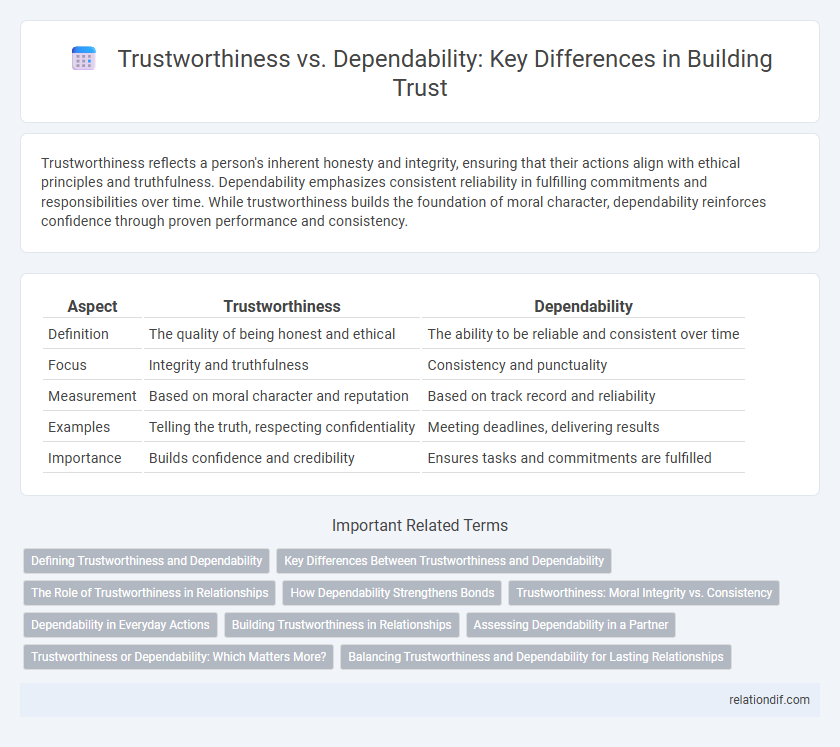Trustworthiness reflects a person's inherent honesty and integrity, ensuring that their actions align with ethical principles and truthfulness. Dependability emphasizes consistent reliability in fulfilling commitments and responsibilities over time. While trustworthiness builds the foundation of moral character, dependability reinforces confidence through proven performance and consistency.
Table of Comparison
| Aspect | Trustworthiness | Dependability |
|---|---|---|
| Definition | The quality of being honest and ethical | The ability to be reliable and consistent over time |
| Focus | Integrity and truthfulness | Consistency and punctuality |
| Measurement | Based on moral character and reputation | Based on track record and reliability |
| Examples | Telling the truth, respecting confidentiality | Meeting deadlines, delivering results |
| Importance | Builds confidence and credibility | Ensures tasks and commitments are fulfilled |
Defining Trustworthiness and Dependability
Trustworthiness reflects a person's or entity's integrity and honesty, ensuring they consistently act with ethical principles and transparency. Dependability emphasizes reliability and consistency in actions, demonstrating the ability to complete tasks and fulfill promises promptly. Together, trustworthiness and dependability form the foundation for building lasting and credible relationships in both personal and professional contexts.
Key Differences Between Trustworthiness and Dependability
Trustworthiness reflects the perceived integrity and honesty of a person, emphasizing ethical behavior and reliability in moral decisions. Dependability, on the other hand, centers on consistent performance and the ability to fulfill tasks or obligations reliably over time. Key differences highlight that trustworthiness is about character and intentions, while dependability focuses on actions and outcomes.
The Role of Trustworthiness in Relationships
Trustworthiness forms the foundation of strong relationships by ensuring consistent honesty, integrity, and reliability in actions and intentions. Unlike dependability, which emphasizes consistent performance and fulfillment of obligations, trustworthiness encompasses moral character and the belief that one will act in the other's best interest. This deep-rooted assurance fosters emotional security and resilience, enabling meaningful and lasting interpersonal connections.
How Dependability Strengthens Bonds
Dependability reinforces trust by consistently meeting commitments and delivering reliable outcomes, creating a foundation of predictability in relationships. When individuals or organizations demonstrate steadfast reliability, they foster emotional security and mutual confidence that deepen interpersonal bonds. This consistent dependability transforms trust from a fragile expectation into a resilient connection anchored in proven performance.
Trustworthiness: Moral Integrity vs. Consistency
Trustworthiness emphasizes moral integrity, reflecting an individual's adherence to ethical principles and honesty, which forms the foundation for genuine trust. Dependability is characterized by consistency in behavior and reliability in fulfilling commitments, ensuring predictable outcomes. While dependability fosters confidence through repeated actions, trustworthiness demands a deeper alignment with moral values that sustain trust even in challenging situations.
Dependability in Everyday Actions
Dependability in everyday actions demonstrates consistent reliability, where individuals fulfill promises and meet expectations without fail. This quality builds trust over time by showcasing accountability through punctuality, quality work, and honest communication. Measuring dependability involves assessing consistent behavior patterns rather than isolated incidents, highlighting its role in establishing long-term trustworthiness.
Building Trustworthiness in Relationships
Building trustworthiness in relationships hinges on consistently demonstrating honesty, integrity, and transparency, which fosters a reliable foundation for deeper connection. Dependability supports trust but trustworthiness requires a commitment to ethical behavior and authentic communication. Cultivating trustworthiness involves aligning actions with promises and valuing mutual respect to strengthen relational bonds.
Assessing Dependability in a Partner
Assessing dependability in a partner involves evaluating their consistency in actions and reliability over time, which forms a foundation for trustworthiness. Key indicators include timely fulfillment of commitments, transparent communication, and a demonstrated ability to handle responsibilities under pressure. Dependability ensures that expectations are met predictably, reinforcing confidence and strengthening relational trust.
Trustworthiness or Dependability: Which Matters More?
Trustworthiness reflects an individual's integrity and honesty, influencing long-term relationship-building and emotional security. Dependability emphasizes consistent performance and reliability, ensuring tasks are completed as expected. While both are crucial, trustworthiness often matters more as it forms the foundation for genuine confidence and deeper interpersonal trust.
Balancing Trustworthiness and Dependability for Lasting Relationships
Balancing trustworthiness and dependability is essential for cultivating lasting relationships, as trustworthiness reflects honesty and integrity while dependability ensures consistent support and reliability. Prioritizing transparent communication and follow-through on commitments strengthens the foundation of mutual trust. Establishing this equilibrium fosters resilience in relationships, promoting loyalty and long-term collaboration.
Trustworthiness vs dependability Infographic

 relationdif.com
relationdif.com